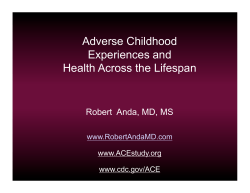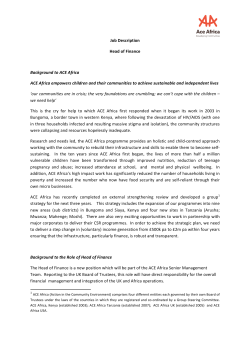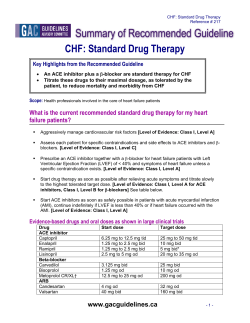
The ACE Study
The ACE Study The Adverse Childhood Experiences (ACE) Study is one of the largest investigations ever conducted to assess associations between childhood maltreatment and later-life health and wellbeing. The study is a collaboration between the Centers for Disease Control and Prevention and Kaiser Permanente's Health Appraisal Clinic in San Diego. More than 17,000 Health Maintenance Organization (HMO) members undergoing a comprehensive physical examination chose to provide detailed information about their childhood experience of abuse, neglect, and family dysfunction. To date, more than 50 scientific articles have been published and more than100 conference and workshop presentations have been made. The ACE Study findings suggest that certain experiences are major risk factors for the leading causes of illness and death as well as poor quality of life in the United States. Progress in preventing and recovering from the nation's worst health and social problems is likely to benefit from understanding that many of these problems arise as a consequence of adverse childhood experiences. Major Findings Childhood abuse, neglect, and exposure to other traumatic stressors which we term adverse childhood experiences (ACE) are common. Almost two-thirds of our study participants reported at least one ACE, and more than one of five reported three or more ACE. The short- and longterm outcomes of these childhood exposures include a multitude of health and social problems. The ACE Study uses the ACE Score, which is a count of the total number of ACE respondents reported. The ACE Score is used to assess the total amount of stress during childhood and has demonstrated that as the number of ACE increase, the risk for the following health problems increases in a strong and graded fashion: Alcoholism and alcohol abuse Chronic obstructive pulmonary disease (COPD) Depression Fetal death Health-related quality of life Illicit drug use Ischemic heart disease (IHD) Liver disease Risk for intimate partner violence Multiple sexual partners Sexually transmitted diseases (STDs) Smoking Suicide attempts Unintended pregnancies Early initiation of smoking Early initiation of sexual activity Adolescent pregnancy Centers for Disease Control and Prevention 1600 Clifton Rd. Atlanta, GA 30333, USA 800-CDC-INFO (800-232-4636) TTY: (888) 232-6348, 24 Hours/Every Day - cdcinfo@cdc.gov The ACE Pyramid The ACE Pyramid represents the conceptual framework for the study. During the time period of the 1980s and early 1990s information about risk factors for disease had been widely researched and merged into public education and prevention programs. However, it was also clear that risk factors, such as smoking, alcohol abuse, and sexual behaviors for many common diseases were not randomly distributed in the population. In fact, it was known that risk factors for many chronic diseases tended to cluster, that is, persons who had one risk factor tended to have one or more other risk factors too. Because of this knowledge, the ACE Study was designed to assess what we considered to be “scientific gaps” about the origins of risk factors. These gaps are depicted as the two arrows linking Adverse Childhood Experiences to risk factors that lead to the health and social consequences higher up the pyramid. Specifically, the study was designed to provide data that would help answer the question: “If risk factors for disease, disability, and early mortality are not randomly distributed, what influences precede the adoption or development of them?” By providing information to answer this question, we hoped to provide scientific information that would be useful for developing new and more effective prevention programs. The ACE Study takes a whole life perspective, as indicated on the orange arrow leading from conception to death. By working within this framework, the ACE Study began to progressively uncover how adverse childhood experiences (ACE) are strongly related to development and prevalence of risk factors for disease and health and social well-being throughout the lifespan. Centers for Disease Control and Prevention 1600 Clifton Rd. Atlanta, GA 30333, USA 800-CDC-INFO (800-232-4636) TTY: (888) 232-6348, 24 Hours/Every Day - cdcinfo@cdc.gov
© Copyright 2025





















